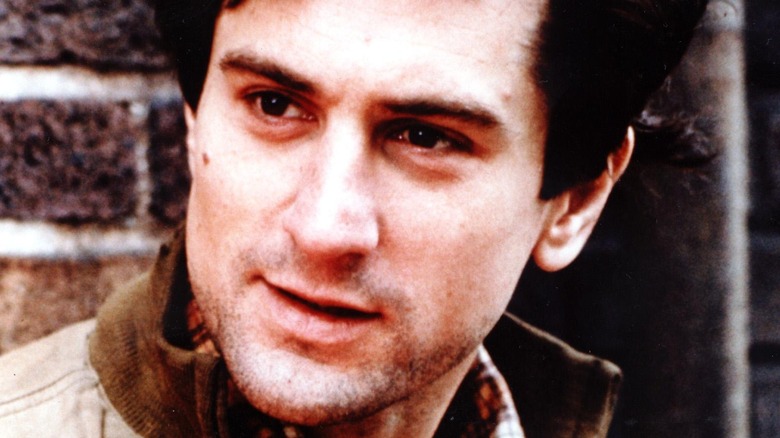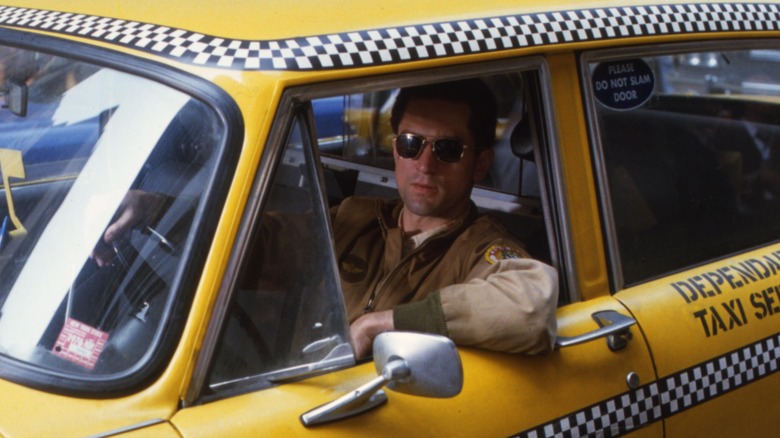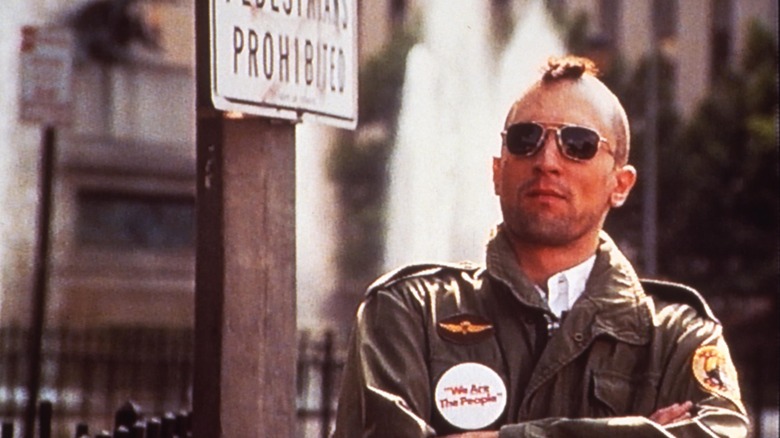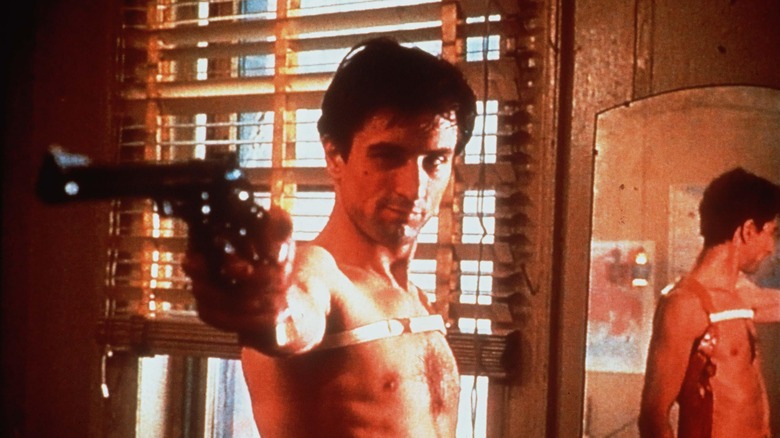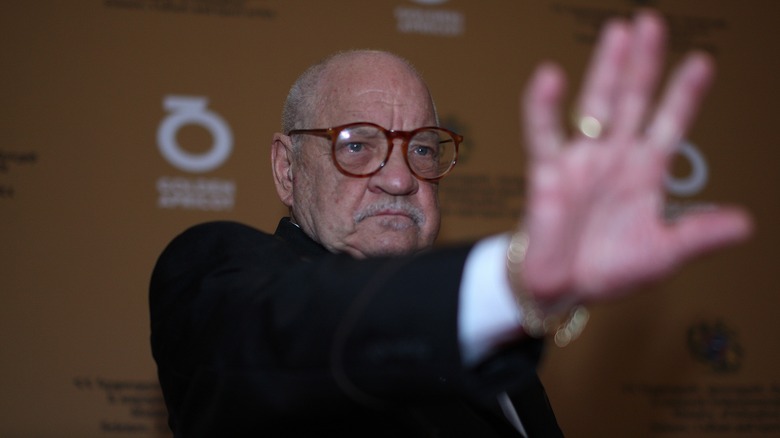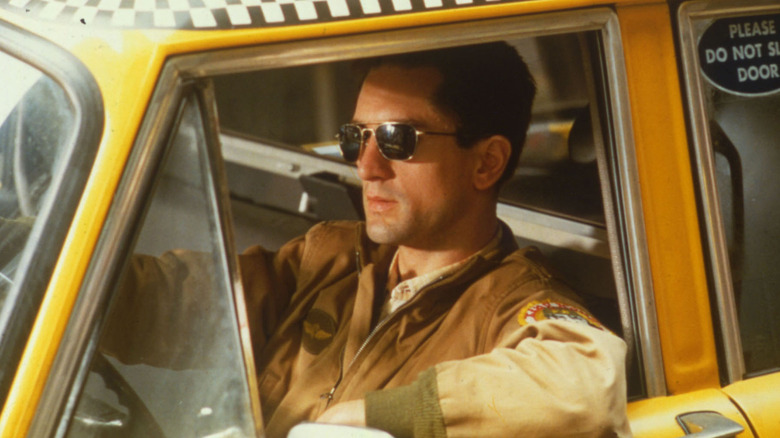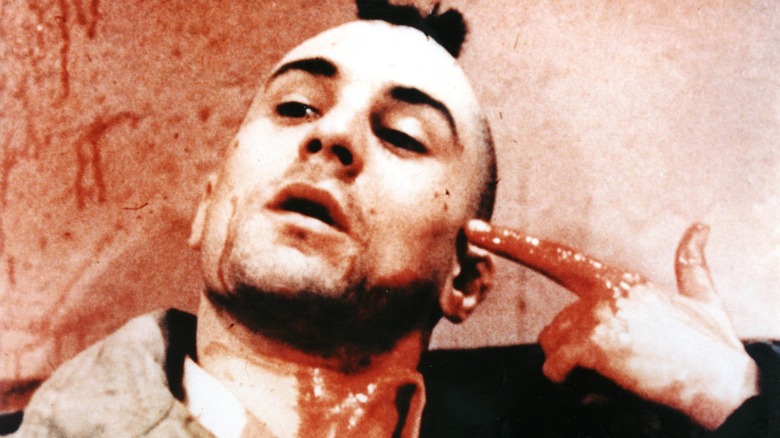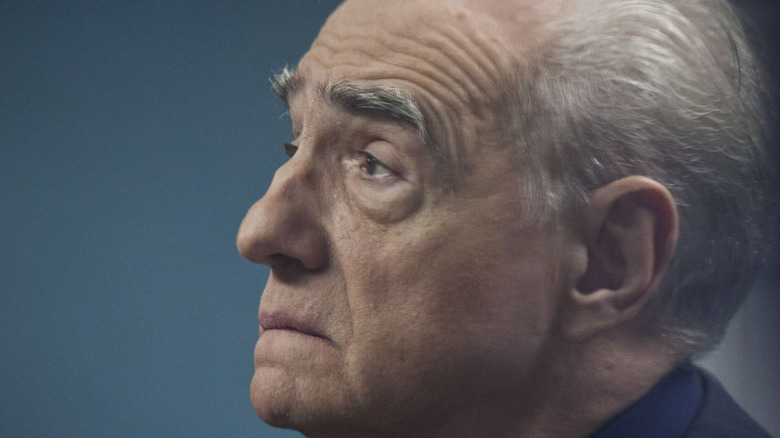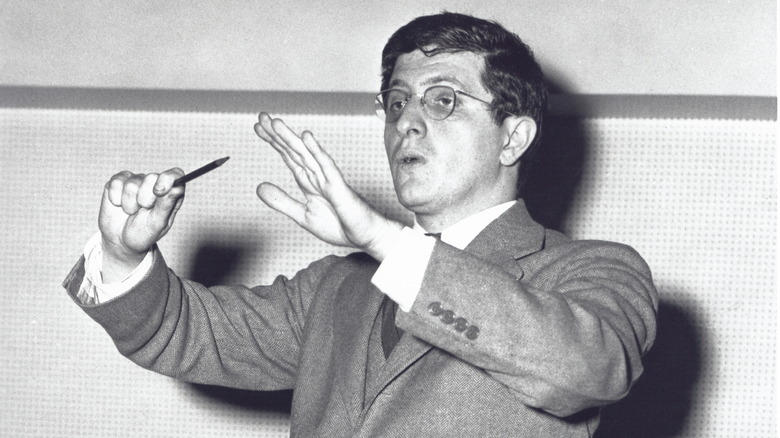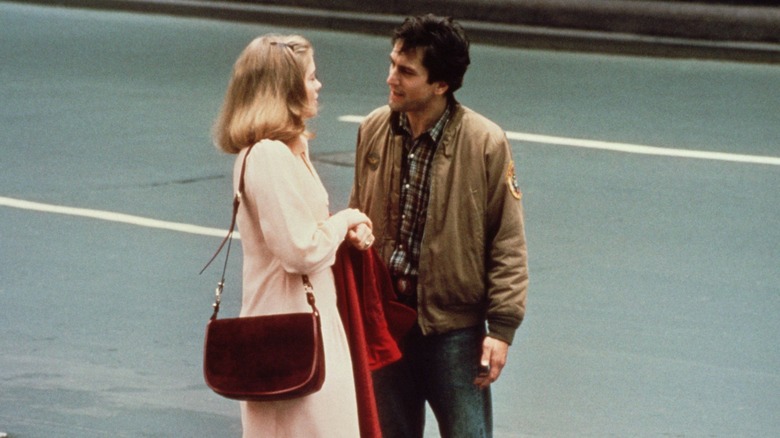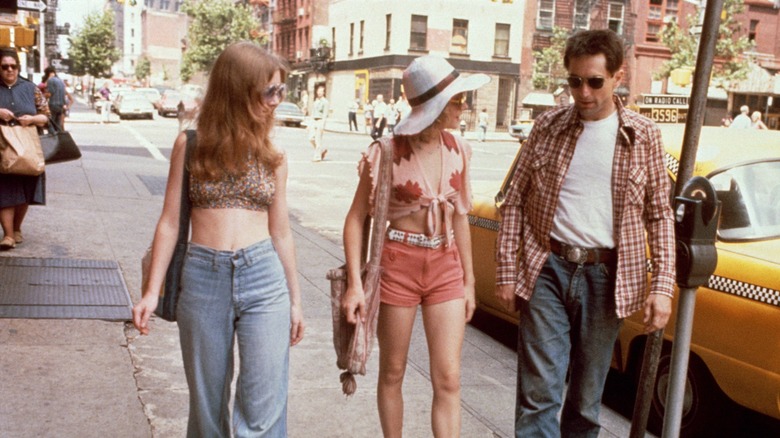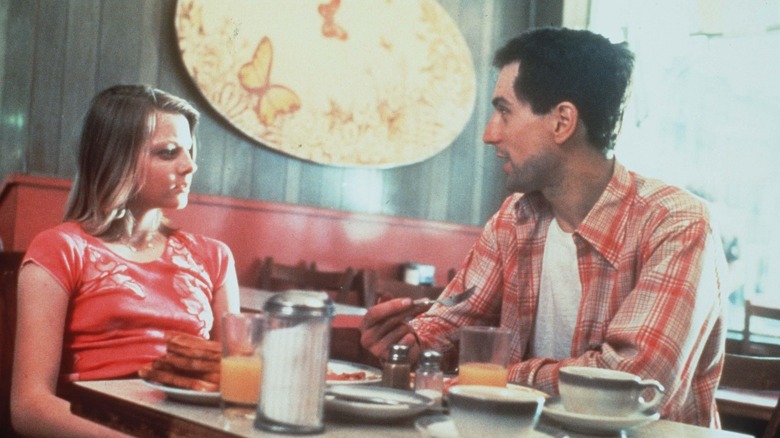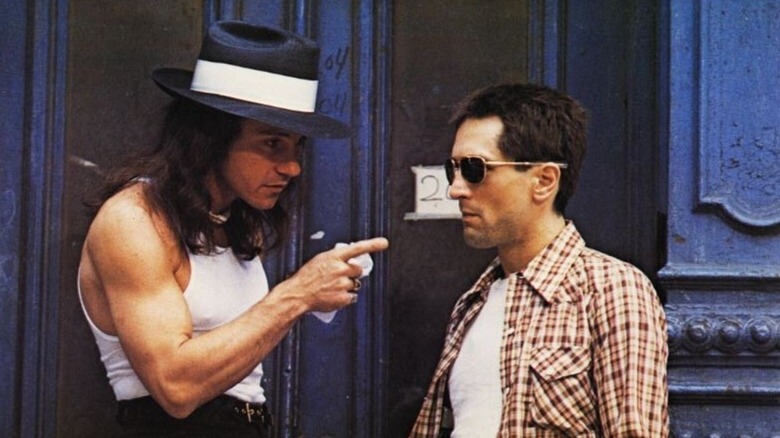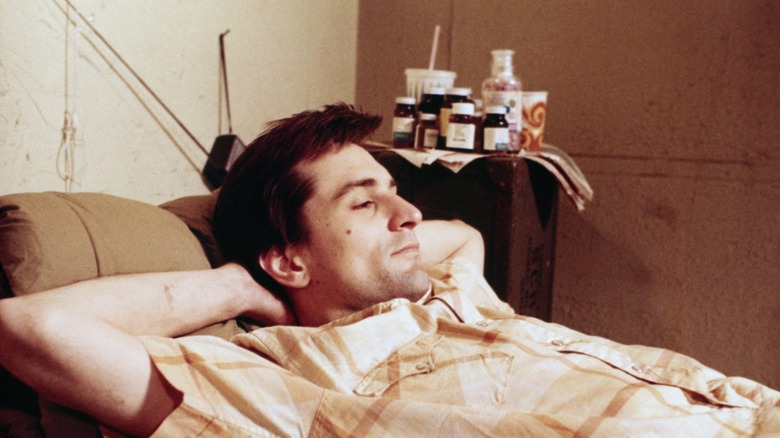The Untold Truth Of Taxi Driver
On paper, a movie about a man who drives taxis doesn't sound all that thrilling. The story of a guy picking up a ride, making small talk, dropping off the ride, and rinsing and repeating ad nauseam is a tough pitch. Yet when the man behind the wheel is Robert De Niro, the small talk is written by Paul Schrader, the action is directed by Martin Scorsese, and the setting is New York City in the 1970s, what was previously not all that interesting becomes incendiary. Upon its release in 1976, "Taxi Driver" breathed a new air of intensity and style into the business of moviemaking. Thanks to the talents of cinematographer Michael Chapman and Scorsese's determination to reach for the stars whilst standing in the gutter, the mean streets of NYC had never looked so vibrant, visual, dangerous, or intoxicating.
The indifferent, garish, seductive, and ever-watchful NYC is an integral and leading character in "Taxi Driver." Yet it's the enigmatic, confused, and troubled anti-hero Travis Bickle who's the real star of the show. Like a one-man howl against a world where he just doesn't fit, Bickle is the eternal outsider. He's the all-walking, all-talking personification of the city that has swallowed him whole and spat him out. Bickle watches, waits, and patiently prowls the streets in his yellow cab in search of the elusive solution to the riddle of himself, the city, and the world. It's one hell of a ride and over four decades later, still worth paying for. The meter's running, and the lights are on green, so let's take a trip into the untold truth of "Taxi Driver."
Robert De Niro drove a real cab to prepare for the role
Being trapped in a steel cage on wheels with strangers for anything between 40 to 70 hours a week is enough to try the patience of a saint. Scratch that — it's enough to turn you into a wild-eyed and frothing-at-the-mouth wreck. If there's one thing, people who drive cabs for a living need, it's resilience, tenacity, and a certain amount of stoicism. When you're busy taking people from all walks of life, here, there, and everywhere on a daily basis, you're going to be exposed to the full spectrum of human behavior, conduct, and quirks. In 1970s New York City, the tough just got a whole lot tougher. That's why in preparation for the role of "God's lonely man," method actor Robert De Niro got behind the wheel of a cab to invoke the spirit of taxi drivers everywhere.
In an interview with Roger Ebert, Martin Scorsese revealed that De Niro would be totally anonymous as he journeyed through the arteries of NYC in search of its dark heart. The "Taxi Driver" director revealed he rode with De Niro several nights "when he was hacking" and was shocked to see that there were no limits to what people would say and do in the backseat. He explained it was as if De Niro didn't even exist before adding that one time a former actor got in and recognized De Niro from the name on the license. The shocked passenger blurted out, "Jesus! Last year you won the Oscar and now you're driving a cab again." De Niro replied that it was for research purposes only, to which the actor replied, "Yeah, Bobby. I know, I've been there too."
Robert De Niro had an idea about a film involving a lonely man wandering New York with guns years before Taxi Driver
Where do great ideas come from? Depending on who you ask, dreams, experience, the innocence of chance, and being in the right place at the right time all play a part. Yet, there's a certain synchronicity to some ideas that cannot be ignored. Take Robert De Niro for example. Years before he gazed with disturbing menace at his reflection and asked with growing enthusiasm, "You talking to me?" De Niro had a vision, and that vision, according to the actor's biographer Shawn Levy, involved, "A lonely man wandering New York City with guns and dreaming of an assassination." Sound familiar?
Levy's book, "De Niro: A Life," also revealed that upon reading Paul Schrader's script for "Taxi Driver" for the first time, Martin Scorsese was so stunned he later recalled, "I almost felt I wrote it myself. Not that I could write that way, but I felt everything. I was burning inside my f****ing skin. I had to make it. And that's all there is to it." After big names such as Jeff Bridges and Al Pacino were discussed to play Travis Bickle, and directors such as Irvin Kirschner and John Milius were considered to helm the film, Scorsese on the strength of his previous outing "Mean Streets" was given the run of the road, but with a caveat: He needed to persuade De Niro to get on board. Fresh from the success of "Godfather II," De Niro took a huge pay cut to help get the film off the ground.
Bruce Springsteen might have influenced Robert De Niro's famous Are you talkin' to me improv
Travis Bickle might have a certain charisma, but he's still the strange guy in the bar with a peculiar earnestness that places everybody's internal warning system on code red. Paul Schrader explains in Shawn Levy's book, "De Niro: A Life," that "De Niro's contribution was much of the schizophrenic quality of the character, which is not in the script. The character I wrote was going crazy in a more linear fashion than the character Bobby acted; his characterization zigs and zags." The most telling and unguarded glimpse the audience gets into the troubled waters of Bickle's soul is during the famous "Are you talkin' to me?" speech which De Niro famously improvised. It's a rollercoaster ride through a mind that's on the brink of falling into a black hole and one of the most famous scenes in cinematic history.
The nagging question of who or what influenced De Niro's famous line remains open to debate. Some say it was a subconscious lift from a film he had once watched. Others believe Bruce Springsteen is a likely contender for the speech that launched a thousand impersonations. Variety reported that during a live chat between Springsteen and Martin Scorsese at a private Netflix event, "The Boss" explained the idea that De Niro lifted the line from an onstage rap Springsteen delivered at a 1975 Roxy Show performance is an "urban myth." Scorsese, on the other hand, believed it might be true, because, "We never know where that came from." De Niro, as usual, said not.
Scriptwriter Paul Schrader was raised a strict Calvinist who didn't see a movie until he turned 18
"Taxi Driver" might well be a classic film, but it's also one that is extremely disturbing and violent. The film has a creeping menace that's palpable from beginning to end. The supporting characters are lurid and Travis Bickle is a larger-than-life human time bomb just waiting to explode and paint his environment red in a fit of self-righteous fury. The script is gritty, raw, and uncompromising and surprisingly comes from the mind of a strict Calvinist who didn't see a movie until he turned 18 (via Roger Ebert). Born and bred in Grand Rapids, Paul Schrader, who made his name writing and directing "Blue Collar," was banned from watching any movie until he turned 17.
His religious upbringing taught him that movies were a corrupting and corrosive influence. Yet, as both saints and sinners know, forbid a fruit and it becomes that little bit sweeter. As the 1960s dawned, Schrader had his first seductive taste of cinema. The only trouble was that the movie in question — Walt Disney's "Absent-Minded Professor" — wasn't all that sweet or seductive. It must have made some impression on a subconscious level, though, because in addition to "Taxi Driver," Schrader's name would go on to be associated with a long list of memorable movies such as "Raging Bull" and "The Last Temptation of Christ." As for the Calvinist community back in Grand Rapids, they "basically hate him," recalled Schrader's former school buddy Reinder Van Til, who added they feel "he's making fun of their values. He's not — but they hate him all the more because he's been successful."
Paul Schrader viewed taxis drivers as men stuck in a box for 60 hours
The stereotype of the standard taxi driver is a cheerful and chatty type, a natural-born social butterfly who is never happier than sharing a joke and a few philosophical insights with their adoring punters. The suffocating silence and unnerving intensity that a character like Travis Bickle brings to the table dispels such myths. Bickle is the stoic and frayed guy who picks you up in the early hours of Sunday morning before he begins to rant like a vengeful and neurotic god about how "someday a rain will come and wash all the scum off the streets." Bickle is the face of a man who has spent far too long dealing with the public at their worse and most depraved.
The detrimental effect of being stuck in a box on wheels for most of the week with strangers could have on an individual's mental health was something Paul Schrader wanted to explore with the character of Bickle. As IndieWire reported, Schrader explained, "There is this kind of myth that the taxi driver was this friendly joking kind of guy who was a character actor in movies. But the reality is that it's a very lonely job, and you're trapped in a box for 60 hours a week."
Travis Bickle was partly based on real-life assassin Arthur Bremer
As one of cinema's most iconic outsiders, Travis Bickle's Mohican haircut, army jacket, sardonic smirk, and air of confused scorn and despairing disdain have seen him take his place in the pantheon of larger-than-life fictional characters who could almost be real. In fact, Bickle is based in part on real-life assassin Arthur Herman Bremer (via The Take). In 1972, Bremer was standing anonymously amongst a crowd of people watching Alabama governor George Wallace give a campaign speech. Yet, little did anyone suspect that the 21-year-old who was decked head to toe in red, white, and blue, was planning to shoot the governor when the speech ended.
According to Absolute Crime, Wallace, who was wearing a huge "Wallace in 72" badge would ask to have his picture taken with the governor before suddenly asking, "A penny for your thoughts." While Wallace wondered what kind of trouble was in front of him, Bremer planned to pull out a concealed gun and shoot him dead. As it turned out, Wallace never uttered a word but he did put five bullets into Wallace and left him paralyzed. For his crime, the would-be assassin was sentenced to 35 years of jail time. Like Bickle, Bremer didn't have political motives — he was just a desperate and pathetic man living on the fringes of society looking for recognition by hurting others.
Taxi Driver is a feminist film according to Martin Scorsese
One of the accusations often leveled at "Taxi Driver" is that it is an exploitative film. Critics have accused it of exploiting both violence and women in a lurid appeal to the base mentality of the audience. In the wake of its release, both Martin Scorsese and Paul Schrader dismissed such criticisms and Scorsese even went as far as to call it a "feminist film." In an interview with Roger Ebert, Scorsese explained, "Because there's a lot of violence to this picture, some of the New York reviews are calling it an exploitation film. Jesus! I went flat broke making this film. My films haven't made a lot of money. Right now, I'm living off my next film."
At one point Scorsese exclaimed, "Taxi Driver is my feminist film. Who says a feminist movie has to be about women?" He also adds that Bickle is like many men, corrupted by the "goddess-whore complex." He explains. "You're raised to worship women, but you don't know how to approach them on a human level, on a sexual level. That's the thing with Travis, he falls for, the Cybil Shepherd character — it's really important that she's blond, a blue-eyed goddess." Schrader added, "He goes from a goddess to a child goddess. The 12-year-old prostitute he's trying to rescue — she's unapproachable, too, for him." Scorsese also hinted that the intensity of Bickle's violence is in direct correlation to the religious worship he feels for the untouchable women in his life. Whether such elements make "Taxi Driver" a feminist film or not is open to debate.
Bernard Herrmann died after finishing the score for Taxi Driver
There are composers who have written movie scores, and then there's Bernard Herrmann. The Academy Award winner was responsible for soundtracking such cinematic classics as "Psycho," "Citizen Kane," "The Day the Earth Stood Still," and "Cape Fear." His glittering career came to an early end when he died at the age of 64, but not before he had completed some of his most memorable work for the soundtrack of "Taxi Driver." The haunting title theme is the sound of a mind unfolding. The rhythmic snare drums and dissonant trumpets announce the arrival of something unsettling, unstable, and unpredictable before the tranquil and lonely saxophone symbolizes the melancholy of a resigned individual cruising an environment he feels completely alienated from. It's a masterpiece of contrasting emotions and a fitting swan song for a musical great.
"Taxi Driver" was dedicated to the memory of Bernard Herrmann and In an interview with Roger Ebert, Martin Scorsese revealed the composer died almost immediately after completing the score. "He was back in Hollywood, he had a full orchestra, people were getting down on their knees to him," explained Scorsese, before adding, "He was doing some jazz passages, and he insisted on finishing that day. I told him we should do it next week because he looked tired. 'No.' he said, 'let's do it now.' That was on December 23. The next morning, the day of Christmas Eve, he was found dead."
Cybil Shepherd was not given a warm welcome on the Taxi Driver set
As the amicable Betsy, Cybil Shepherd plays the part of the woman who unwittingly enchants Travis Bickle with her graceful charm and easy-going ways. Yet when he takes her to a hardcore porn flick at the cinema, things quickly turn foul. Realizing the loner in the yellow cab has the sort of issues that are best given a wide berth. Besty returns Travis's flowers and refuses to take his calls. This triggers the beginning of Travis's epic meltdown and he later visits Betsy at work and snarls, "You're in hell and you're going to die in hell like the rest of them." After being forcibly ejected from Betsy's office, Travis walks away and muses philosophically like a born-again chauvinist, "I realize now she's just like the others, cold and distant. And many people are like that, women for sure."
According to Peter Biskind's book, "Easy Riders Raging Bulls," Martin Scorsese and Paul Schrader were not so enamored of Sheperd as Bickle was of Betsy. They had doubts she had the acting chops to deliver the goods. Schrader explained, "We always said we were looking for a Cybil Shepherd type. How much worse can she be than a Cybil Shepherd type?" According to Peter Bogdanovich who had an affair with Shepherd, De Niro made a move on Shepherd but she knocked him back. Just like Travis, the rejection allegedly hit De Niro hard. A source quoted in the book explained, "He treated Jodie Foster like she was a queen. He treated Cybil like a pile of dogs**t. The truth is, Bobby, treated people badly if he decided they were not up to stuff."
Jodie Foster's character was based on a real-life underage prostitute
Jodie Foster's character in "Taxi Driver" is easily the most unsettling aspect of the entire movie. As a 12-year-old prostitute called Iris is it highly disturbing to see how she flies under the radar of New York in the 1970s and how people in her environment indifferently accept the nightmarish reality of a child selling their body. Foster's portrayal becomes even grimmer when you realize the character was based on an underage prostitute that Paul Schrader picked up in a New York bar one night. Schrader explained to Film Comment that he was down in the dumps in the early hours when he ended up inviting a girl home with him.
Schrader explained, "I should have been forewarned when she was so easy to pick up; I'm very bad at it. The only reason I tried it that night is I was so drunk. I was shocked by my success until we got back to my hotel and I realized she was: (1) a hooker; (2) under age; and (3) a junkie." With a seemingly callous disregard for the girl's plight, Schrader invited Scorsese to join them for breakfast because he believed he had found the real-life Iris. Schrader added, "Marty came down, and a lot of the character of Iris was rewritten from this girl who had a concentration span of about 20 seconds. Her name was Garth."
Jodie Foster often felt uncomfortable whilst filming Taxi Driver
As a 12-year-old playing a prostitute, Jodie was entering unprecedented territory in cinematic history. It was also potentially very dangerous and harmful territory, even for someone who had made her acting debut aged six. Playing Iris was Foster's breakthrough role and saw her nominated for a Best Supporting Actress Oscar. The New York Times reported that Newsweek described Foster as "an amazing blend of innocence and precocious sexuality," and The Village Voice awarded her "top acting honors" for her portrayal of a "breathtakingly goofy teenage hooker." Post-filming, Foster explained in an interview she was initially reluctant to take the part. "It was a great part for a 21-year-old, but I couldn't believe they were offering it to me. I was the Disney kid. I thorough, 'What would my friends say?' I could just hear their little snickerings. So I didn't want to do it."
When Foster finally agreed to the part, she explained, "There was a welfare worker on the set every day. She saw the daily rushes of all my scenes and made sure I wasn't on the set when Robert De Niro said a dirty word." Yet years later, as The Independent reported, Foster revealed on a 2016 episode of "The Graham Norton Show" that she felt uncomfortable when on set and "nobody knew how to direct me." Foster added, "Scorsese would say something like 'unzip his fly' and just start laughing and not know what to do, so he would hand it over to Robert De Niro, and then he'd tell me what to do. And he was even more 'Robert De Niro' then, even quieter and more strange."
Harvey Keitel spent time with a real pimp to research his role
Harvey Keitel has never looked as sleazy and dangerous, nor acted as reptilian and repulsive as he did when he pulled on the two-tone fedora and slipped into the role of Matthew "Sport" Higgins, the pimp with the painted coke nail in "Taxi Driver" who struts around the place, swishing his long hair and flexing his muscles could only have existed in the mean streets of 1970s New York. The sex trafficker who gets under Travis Bickle's skin to stir and simmer the righteous fury in his soul is a god of the gutters, a duke of the depraved, and a connoisseur of corruption. He's also a case study on a real pimp from that era.
Page Six reported at the Tribeca Film Festival to mark the 40th anniversary of "Taxi Driver," Keitel explained that before filming, "I was looking to meet a pimp because I didn't know what to do about being a pimp." He added that when appearing in a Broadway Show, he introduced himself to a girl on 10th Avenue as an actor and asked, "I'm looking for someone to help me to understand what it's like to be a pimp. Could you help me out?" Keitel added, "She looks at me and goes, 'No one's going to talk to you.' So I sulked away." Keitel would later hook up with a pimp to help him prepare for the role and explained, "He said he was a former pimp, I don't know what that means, but we improvised for a couple of weeks together. We had a good business together."
The film's final scene could be a fantasy of a dying Travis
After finally putting an end to Sport and triggering a one-man bloodbath in a brothel, Travis Bickle attempts to take his own life, but the fates have other ideas, and he finds he's missing that one last bullet. In the final scene, instead of seeing Bickle behind bars or gunned down by cops, we have fast-forwarded to the future where newspaper clippings hail him as a hero, and Iris' dad thanks him in a letter for saving his daughter. To complete his saintly rehabilitation, we discover he's still driving cabs, and his last fare of the film is none other than Betsy who wants to reunite with Bickle, now that he's a national hero. Yet, the enigmatic and humble taxi driver is having none of it and simply drives off into the distance like the Lone Ranger looking to save other damsels in distress.
As endings go it's a bit cheery compared with the harrowing hell and horror that preceded it. Many, including Roger Ebert, have gone as far as to speculate the final scene could be little more than the desperate thoughts of a dying Bickle looking for some sort of redemption. Yet as far as Robert De Niro is concerned, it's absolute hogwash. He told The Guardian, "Well, that's an interesting theory. I know that was not the intention, but it's as valid as anything." De Niro also added that he'd also love to do a film revealing what Bickle is up to in the modern era. He explained, "I'd like to see where Travis is today. There was something about the guy — all that rage and alienation, that's what the city can do to you." Paul Schrader also denied the dream sequence theory.
If you or anyone you know is having suicidal thoughts, please call the National Suicide Prevention Lifeline by dialing 988 or by calling 1-800-273-TALK (8255).
